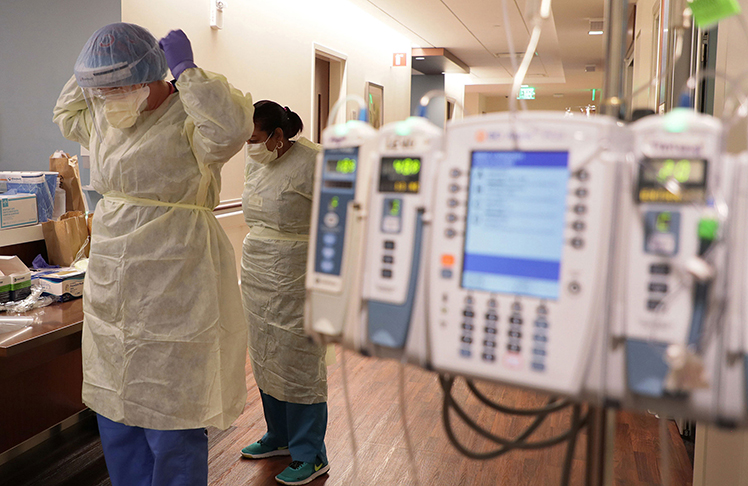
By Madeline Holcombe, CNN
(CNN) — This Delta variant could be the last major surge of the Covid-19 pandemic, but now is not the time for the U.S. to grow complacent as it has yet to run its course, an expert said Monday.
“We still have a couple of months to go until this Delta wave sweeps across the country in a regionalized fashion and we are sort of done with it,” said Dr. Scott Gottlieb, the former director of the U.S. Food and Drug Administration.
“You’re starting to see an uptick in cases in the colder parts of the country and, as people are driven indoors without masks on, you’ll start to see cases pick up,” he said.
Nationally, the average daily rate of cases, hospitalizations and deaths from Covid-19 are on the decline. In the last week, the daily average number of infections has dropped by more than 15,000 to more than 86,000, and an average of 200 fewer people are dying per day, according to data from Johns Hopkins University.
Still, an average of about 1,500 people died every day in the last week of Covid-19, according to JHU data.
Much of the national improvement can be attributed to southern states coming out of the worst of the variant surge, Gottlieb told CNN. But not all regions are faring so well. Numbers are ticking up in the West and Midwest, and it is still unclear how heavy the impact will be in the Northeast, he said.
Gottlieb has predicted the worst of it will be over for much of the country around Thanksgiving and that prevalence levels will decline around Christmas, but not all health officials are so certain.
“I’m not sure that we can predict at this time that we’re not going to see a winter surge,” CNN medical analyst Dr. Leana Wen said. “I really think it’s too early for us to celebrate and say that the worst is behind us.”
Before that celebration, the U.S. needs to keep the trajectory of cases, hospitalizations and deaths going down, a feat that depends on vaccinating more people, Dr. Anthony Fauci said Monday.
“We have about 68 million people in this country who are eligible to be vaccinated who are not yet vaccinated,” said the director of the National Institute for Allergy and Infectious Diseases. “We need the overwhelming proportion of those unvaccinated people to be vaccinated and then we can be quite confident that if we can do that, you will not see a resurgence.”
“This really depends upon us and our ability to rise to the occasion and get people vaccinated,” Fauci said.
Vaccines are key to accelerating through the pandemic
Vaccines, in addition to other tools like testing, are what will help bring the Covid-19 pandemic into its endemic stage in the U.S., Gottlieb said Monday.
When a virus becomes endemic, it poses a persistent risk of infection but is not causing large numbers of cases with severe disease and death.
“The reason why we’re going to get through this and the reason why we’re going to accelerate our way through this pandemic to an endemic phase with this virus is because of the vaccine,” he told CNN’s Chris Cuomo.
“If you look at past pandemics, they’ve lasted upwards of five years. This pandemic probably won’t last that long for the West,” he said.
Gottlieb said treatments and testing are also important, but vaccines are “a key part” of fighting the pandemic.
“The fact that we could build a wall of immunity through vaccination, and not just mass-infecting the population, is going to be how we accelerate our way out of the pandemic into an endemic phase with this virus where we can hopefully keep it at bay,” Gottlieb said.
Meanwhile, Pfizer and BioNTech said last week they are seeking an emergency use authorization for a vaccine for children as young as 5 years old.
If approved, the increased accessibility will benefit the health of young children and the communities they occupy, experts said.
“We will really depend on kids, younger kids, getting vaccinated in order to increase the overall immune protection,” Wen said.
Vaccine mandates work, Fauci says
As part of the drive to increase vaccinations, many health experts are calling for mandates in schools, workplaces and businesses.
Fauci told CNN’s Wolf Blitzer that the federal government is trying to persuade people to get vaccinated on their own, but some may need to be required to do so.
“We’ve obviously been trying very hard,” Fauci said. “We try to get trusted messengers out there and try and get this away from being an ideological or political statement, get back into the realm of pure public health, and try to convince people,” Fauci said.
“I mean, we don’t like to be telling people what they need to do with regard to vaccines. But we know that mandates work.”
But while many institutions have made the decision to mandate vaccines for their students, employees and clients, some states leaders are less inclined.
On Monday, Texas Gov. Greg Abbott issued an executive order prohibiting any entities from requiring individuals to get vaccinated.
“The COVID-19 vaccine is safe, effective, and our best defense against the virus, but should remain voluntary and never forced,” said Abbott.
The-CNN-Wire
™ & © 2021 Cable News Network, Inc., a WarnerMedia Company. All rights reserved.















